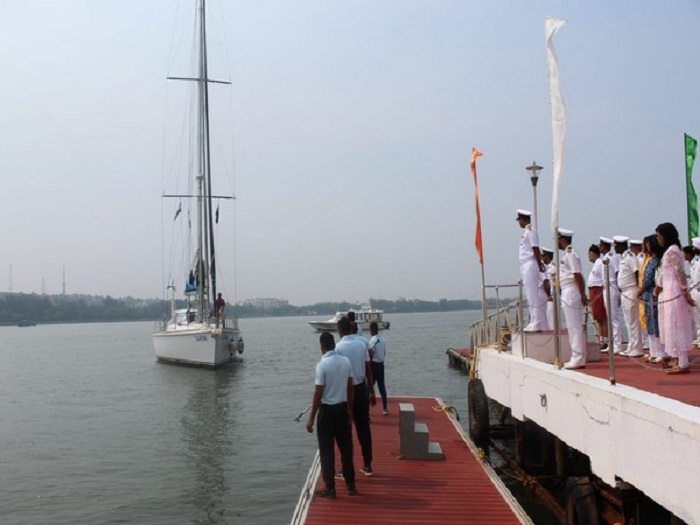
New Delhi: The Indian Naval Sailing Vessel (INSV) Tarini on Apr 21 returned triumphant to its base port at Goa after a historic transoceanic expedition of nearly two months' duration.
According to the Indian Navy, the expedition was undertaken in double-handed mode by Lt Cdr Dilna K and Lt Cdr Roopa A, two women officers of the Indian Navy. The exceptional journey of the two women navy officers has marked a historic milestone as they become the first from India to accomplish such a feat.
The Indian Navy says the expedition underscores the force's commitment to promoting gender equality and empowering women in the maritime domain.
This remarkable achievement will not only inspire but also pave the way for future generations of personnel especially women in the navy to volunteer for challenging maritime adventure activities.
Indian Navy, like some of the leading naval forces across the globe, is expanding its opportunities for women with its philosophy of 'all roles-all ranks'.
During the Navy Day 2023 celebration in December last year, Indian Prime Minister Narendra Modi said the government was committed to increasing the strength of women in the armed forces, including the Navy, which is at the forefront of inducting women and projecting ‘nari shakti’.
Recently, the Chief of Naval Staff, Admiral Hari Kumar, envisioned the Indian Navy’s aspiration of having a woman as its chief within the next 30-35 years.
December, 2023, was a historic month in the history of the Indian Navy as the force announced the appointment of the first-ever woman commanding officer in a naval ship (INS Trikant).
Meanwhile, the Indian Navy last year incorporated more than 1,000 women "agniveers" into the force. Agniveers are new military rank recruits who serve for a tenure of four years in armed forces and are eligible after the term to apply for continued service in the forces.
The Indian Navy is all set to take its woman empowerment policy to a new high with its decision to open its doors to women across ranks and departments, including its Submarine arm, which is considered to pose the greatest challenge for women volunteering for combat roles in any of the three armed services -- Army, Air Force and Navy.
Women's participation in submarine duties is not a new phenomenon. Women, both in officer and enlisted ranks, have been serving on submarines for more than three decades in the naval forces of many leading countries across the globe.
Norway was the first to induct women in its navy in 1985. The country appointed its first woman submarine captain in 1995.
Sweden, Australia, and Spain followed in the 1990s, while Canada and Germany inducted women in their submarine arms in the 2000s.
Later in the 2010s, the US, UK, and France appointed women officers to their submarine arms, while Japan and South Korea followed the path in 2018 and 2023, respectively.
India, which made the decision to induct women to submarine combat in 2023, is currently in the process of evolving an induction plan as there are many issues and challenges.
This combat role is super challenging itself. Apart from this, there are several issues related to bunk and crew management, accomodation and privacy, according to reports.
Besides health and medical care issues, the psychological implications of mixed-gender crews also come into play.
However, defence experts are optimistic that the Indian Navy will manage all these challenges, and they have to do it to bring this transition.
Experts believe, imbibing knowledge from other leading countries, where women officers are working in submarines, the Indian Navy, which had inducted women on surface ships in 1997, will handle the issues in Indian cultural context.
According to experts, the Indian Navy, which had included separate accommodation for women officers and enlisted personnel in INS Imphal commissioned in December last year, will definitely shape its crew and bunk management and privacy policies for submarines.